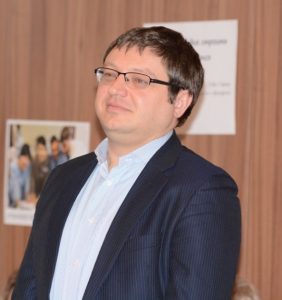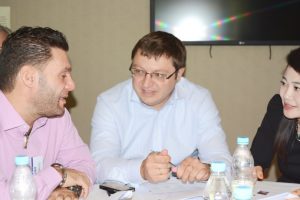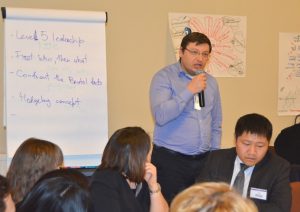Andrey Andreev: “Speaking English is already 90% of success”
 As you know, speaking English is a present day ‘must have’, and Volga-Dnepr employees’ ability to speak the same language with customers and partners is vitally important. This is why teaching English is one of the most significant tasks of the strategic project “100 new generation executives to lead the strategy realization”.
As you know, speaking English is a present day ‘must have’, and Volga-Dnepr employees’ ability to speak the same language with customers and partners is vitally important. This is why teaching English is one of the most significant tasks of the strategic project “100 new generation executives to lead the strategy realization”.
We are now launching a series of articles about Volga-Dnepr executives whose language abilities contributed much to their career growth. They will share their secrets and give valuable recommendations on the language mastery. Learning English is within everyone’ power! Today we are speaking to Andrey Andreev, vice president on regular flights in Europe, FARMA sales director, the graduate of the Future Leaders program.
– Andrey, when did you start learning English?
– At the age of six when I entered school in Ulyanovsk in 1990. We had the same English teacher Valentina Sergeevich throughout all school years – from the 1st to 11th form. With her we started the alphabet and went that far as the Intermediate and upper-intermediate level. I think this was the key factor. And now I keep learning English, as learning is an ongoing process. You always come across new words. For example, not long ago being on holiday I came across the word ‘pendulum’.
– Did you do any English courses in Volga-Dnepr language school when you entered the company?
– I did. I’d been studying English in VD language school for three years. And at the beginning of 2000 I successfully passed the Cambridge FCE exam.
– How did you apply your language skills in the company?
 – Working in the Flight Management Department was priceless, especially phone calls. When you see your interlocutor you can use body language to explain something, whereas on the phone you have only language means to make yourself clear. Communication with aviation authorities, agents across the world was valuable experience. It’s like you are speaking with the whole world.
– Working in the Flight Management Department was priceless, especially phone calls. When you see your interlocutor you can use body language to explain something, whereas on the phone you have only language means to make yourself clear. Communication with aviation authorities, agents across the world was valuable experience. It’s like you are speaking with the whole world.
– Were there any challenges?
– My first journey abroad was really shocking. In 2003 I was rotated to the position in London. I entered Great Britain being 100% confident in my language skills. And suddenly realized that I couldn’t understand even half of what was spoken – that was due to unusual British accent. As the first week passed I got used to it and everything came in its place.
– Has the language mastery contributed to your career growth?
– Absolutely! Without language skills I wouldn’t have achieved any considerable results in Volga-Dnepr: We work for the international company. Most of our customers are foreigners. So, speaking good English is a must. In negotiations, speaking English is already 90% of success. Making oneself clear in English is a minimum requirement for any negotiations. In Europe people speak different languages, but English is the main language. When I moved to Germany I noticed that English is spoken in receptions, bars, restaurants, tills. And certainly this is the language for business communication.
Besides, when you know the language you can make yourself 100% clear, without risk of errors which could occur in translation.
The first global meeting on pharmaceutical goods transportation was held on November 22, 2016. The closing speech was made by Alexey Isaykin, the company president. He was speaking for 15 minutes, all in English, and successfully conveyed the idea. Many times before I’d caught myself thinking about errors made in translation which could totally alter the speaker’s message. So, when the president did it in English, conveying everything he had in mind, no one was left in doubt.
 – What helps language learning? Can you share?
– What helps language learning? Can you share?
– Speaking practice really helps. When I was doing language course in Volga-Dnepr language school I caught myself thinking in English. As you wake up you start recollecting the words, think, read, and speak English.
Secondly, movies in English. In 2008 I spent four months in Netherlands. I often went to the movies. They were run in English with Holland subtitles. It really helped me. I do recommend it.
Thirdly, boost you vocabulary. When communication requires new words, you shouldn’t be lazy – look them up, learn and remember them. That’s how you can add to your vocabulary.
Do not be afraid of speaking! My first English teacher was “riding hard” and in the farewell party she uttered very important words: «Level of English is identified not by how much you know but how well you can perform in public». It’s vital when your language skills contribute to perfect communication. That’s what you should aim at. Do not be afraid of speaking, of making mistakes.


